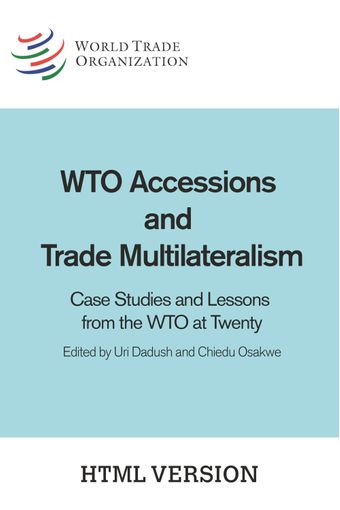Export duty commitments: The treaty dialogue and the pattern of commitments

- Authors: Chiedu Osakwe, Dayong Yu and Petra Beslac
- Source: WTO Accessions and Trade Multilateralism , pp 37-37
- Publication Date: January 2015
- DOI: https://doi.org/10.30875/4394282a-en
- Language: English
This chapter focuses, pursuant to Article XII accession-specific commitments, on the evolving disciplines on export duties, distinguished from the broader setting of export restrictions. From a rules angle, export duties were not subject to disciplines, in contrast to import duties that have, classically, been bound in schedules of concessions and commitments on goods since GATT 1947. Pursuant to Article XI:1 of the General Agreement on Tariffs and Trade (GATT) 1994 (rules for ‘quantitative restrictions’), prohibitions or restrictions on imports and exports, such as bans, quotas and restrictive licences, are generally prohibited, except for duties, taxes or other charges. In economic operations, export duties with price discrimination effects between domestic and foreign producers have resulted in efficiency losses and anti-competitiveness, and have undermined economic welfare. In accession negotiations, the establishment of disciplines and improvement in economic welfare has framed the treaty dialogue. This dialogue has made evident a range of issues that are systemic and that have involved questions on international economic cooperation, revolving around the broader use of export restrictions and their overlap with export duties. This chapter reviews the substance of the treaty dialogue on export duties and identifies the extent and pattern of specific obligations on export duties in the Article XII Accession Protocols deposited thus far. The analysis shows that fifteen Article XII members have accepted accession-specific obligations on the application of export duties. These obligations range across ‘abiding’ by the provisions of the WTO Agreement; ‘binding and/or fixing’ applied export duty rates; and, ‘reducing’, ‘eliminating’ or ‘foreclosing’ on the use of such duties. Of precedential value is the modification of the classical 1947 architecture of the GATT Goods Schedule to create a Part V on Export Duties in the context of the WTO accession commitments of Russia in its Goods Schedule. This chapter argues that accession-specific commitments have deepened and extended original WTO rules governing export duties as an instrument of trade policy. The overall systemic effect has been positive, namely to constrain, reduce, eliminate and/or bind, hence contributing to clarity and predictability of the rules with pro-competitive effects, enhancement of market access opportunities and improvements in economic welfare. The chapter argues that WTO accession-specific obligations for export duties have set the multilateral standard for disciplines in this area. Nevertheless, it is worrying that even as the disciplines on export duties are being formulated and strengthened via Article XII members, the facts suggest the higher use of such export duties by original members over the period from 2003 to 2009.
-
From This Site
/content/books/9789287046796s013-c013dcterms_subject,pub_countryId-contentType:WorkingPaperSeries -contentType:Periodical -contentType:BookSeries -contentType:ReportSeries105


